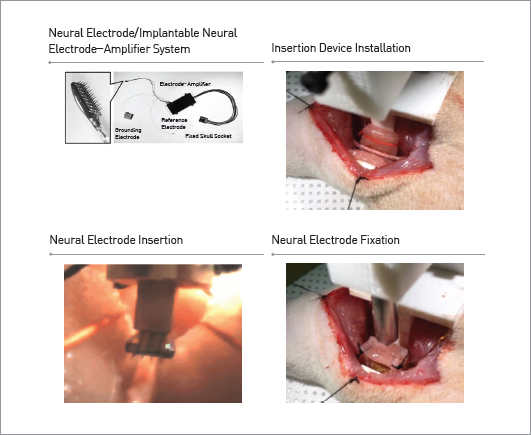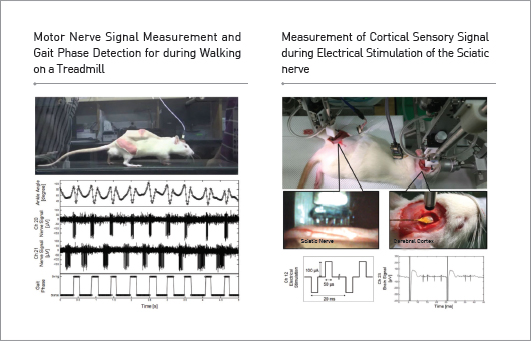Peripheral nerve signal processing technology that selectively
measures and stimulates peripheral nerves to restore the motor
and sensory functions of amputees and paralyzed patients
Client / Market
- Implantable electronic medical device
- Prosthetic hand and leg for amputee
- Electrical stimulator for paralyzed patient
- Degenerative nerve disease treatment device

Necessity of this Technology
- Conventional peripheral nerve electrode system has difficulty in measuring and
stimulating in a nerve fiber unit.
- Motor nerves are less distributed than the sensory nerves and are difficult to be
measured due to the interference of muscle signals and motion artifacts.
- Need a surgical technique of stably inserting a multi-channel neural electrode in
the peripheral nerve to measure and stimulate in the nerve fiber unit
- Need a measurement technology that guarantees a high signal to noise ratio and a
technology to discriminate a motor nerve fiber from a peripheral nerve bundle
Technical Differentiation
- A neural electrode implantation technology that inserts a multi-channel neural
electrode at a precise location and depth in the peripheral nerve bundle and
minimizes the damage in the neural electrode and nerve tissue
- By absorbing the multi-channel neural electrode with vacuum, transfer and
implantation are stable. By implanting the multi-channel neural electrode with the
shock impulse, implantation can be done easily regardless of the surface tension of
the peripheral nerve bundle.
- Peripheral motor nerve signal measurement technology to minimize the
contamination of nerve signals from muscle signals and motion artifacts and
discriminate motor nerve signals among all nerve signals detected
- By locating the neural electrode inside the closure wrapped with a metal gauze, it
can be shielded from muscle signals and motion artifacts, and by applying electrical
stimulation to all channels of the neural electrode to check the availability of
muscular motion, the motor nerve fibers can be distinguished.
Excellence of Technology
- Provide motion commands to the prosthetic arm controller by analyzing the efferent
motor nerve signals and recognizing the motion intention
- Developed the multi-channel action potential detection and classification technology
- Verified the possibility of motion intention recognition based on analysis of
movement of an animal model
- Developed a vision system for synchronization of motor nerve signals and motion
analysis data
- Developed a gait phase detection algorithm that can discriminate stance phase and
swing phase while walking on a treadmill
- Delivers the tactile sensory information by applying electrical simulation to afferent
sensory nerves based on the prosthetic arm sensor
- Developed the technology for multi-channel stimulation pattern generation and
interleaved stimulation
- Verified the possibility of tactile sensory information delivery by measuring the
cortical sensory signal of an animal model
- Generated an electrical stimulation pattern according to cutaneous sensation area
that can evoke a cortical sensory nerve signal
- Confirmed the similarity of the mechanical stimulation on skin and electrical
stimulation of peripheral nerve to the evoked cortical sensory signal

CURRENT INTELLECTUAL PROPERTY RIGHT STATUS
PATENT
- Nerve Electrode Insertion Device (KR1808254)
- Recording System of Peripheral Motor Nerve Activity and Method for Discriminating
Peripheral Motor Nerve Activity (KR2017-0172501)
KNOW-HOW
- Neural electrode implantation in peripheral nerve and cerebrum
- Nerve signal amplifier and electrical stimulator design technology
- Multi-channel action potential detection and classification technology
- Multi-channel stimulation pattern generation and interleaved stimulation
technology
- Motor nerve signal measurement-based motion intention recognition technology
- Sensory nerve electrical stimulation-based tactile sensory information delivery
technology

|






